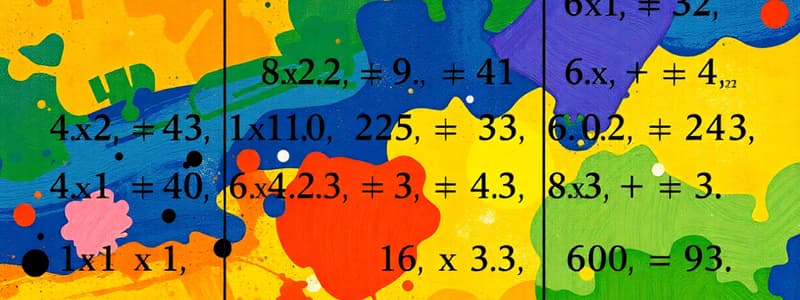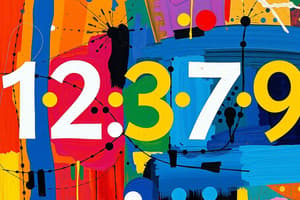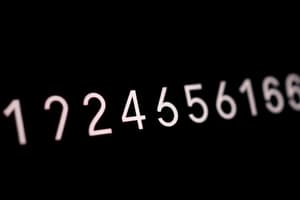Podcast
Questions and Answers
Which of the following is NOT a subset of real numbers?
Which of the following is NOT a subset of real numbers?
- Complex numbers (correct)
- Natural numbers
- Rational numbers
- Integers
Rational numbers can be expressed in the form of a function m/n, where m and n are integers and n ≠ 0.
Rational numbers can be expressed in the form of a function m/n, where m and n are integers and n ≠ 0.
True (A)
The closed interval from a to b is represented as ______.
The closed interval from a to b is represented as ______.
]a, b[
What is the set of x such that x is an integer and a < x < b?
What is the set of x such that x is an integer and a < x < b?
What is meant by 'solving the inequality'?
What is meant by 'solving the inequality'?
What is the symbol for an open interval from a to b?
What is the symbol for an open interval from a to b?
What is the solution set of the inequality 6/(x – 1) ≥ 5 if x > 1?
What is the solution set of the inequality 6/(x – 1) ≥ 5 if x > 1?
Flashcards are hidden until you start studying
Study Notes
Preliminaries
- Calculus involves real numbers that can be expressed as decimals.
- Real numbers include natural numbers, integers, and rational numbers.
- Natural numbers: 1, 2, 3, 4, ...
- Integers: 0, ±1, ±2, ±3, ...
- Rational numbers: can be expressed as m/n, where m and n are integers and n ≠ 0.
- Examples of rational numbers: 200/67, 13/3, (5 - 5)/67, 1/3, 0/0, 3/0
- Division by zero is undefined.
- Division by zero results in undefined expressions.
- Real numbers can be represented on a number line; this is called the real line.
Intervals
- Interval: a set of real numbers.
- Open interval: (a, b) represents all numbers between a and b, excluding a and b.
- Closed interval: [a, b] represents all numbers between a and b, including a and b.
- Other variations include half-open intervals: (a, b] and [a, b).
Inequalities
- Solving inequalities involves finding the range of numbers that satisfy a specific inequality in the variable 'x.'
- "=" means "implies."
- Inequalities can be solved by manipulating both sides using the following rules:
- Adding or subtracting the same number to both sides doesn't change the solution.
- Multiplying or dividing both sides by the same positive number doesn't change the solution.
- Multiplying or dividing both sides by the same negative number reverses inequality signs.
- Example:
- 2x + 4 < 12 is solved by subtracting 4 from both sides: 2x < 8.
- Then divide both sides by 2: x < 4. Therefore, the solution is all x < 4.
Solving Inequalities
- Example 1:
- 3x + 12 < 0 can be solved by subtracting 12 from both sides: 3x < -12.
- Dividing both sides by 3 gives x < -4.
- The solution set is the open interval (-∞, -4), which means all numbers less than -4.
- Example 2:
- 7x + 3 > -18 can be solved by subtracting 3 from both sides: 7x > -21.
- Then dividing both sides by 7 gives x > -3.
- The solution set is the open interval (-3, ∞), which means all numbers greater than -3.
- Example 3:
- 6/(x - 1) ≥ 5 can hold only if x > 1.
- Multiplying both sides by (x - 1) results in 6 ≥ 5(x - 1).
- This simplifies to 6 ≥ 5x - 5.
- Adding 5 to both sides provides 11 ≥ 5x.
- Dividing both sides by 5 gives x ≤ 11/5.
- The solution set is the half-open interval (1, 11/5], which includes all numbers greater than 1 but less than or equal to 11/5.
Studying That Suits You
Use AI to generate personalized quizzes and flashcards to suit your learning preferences.



